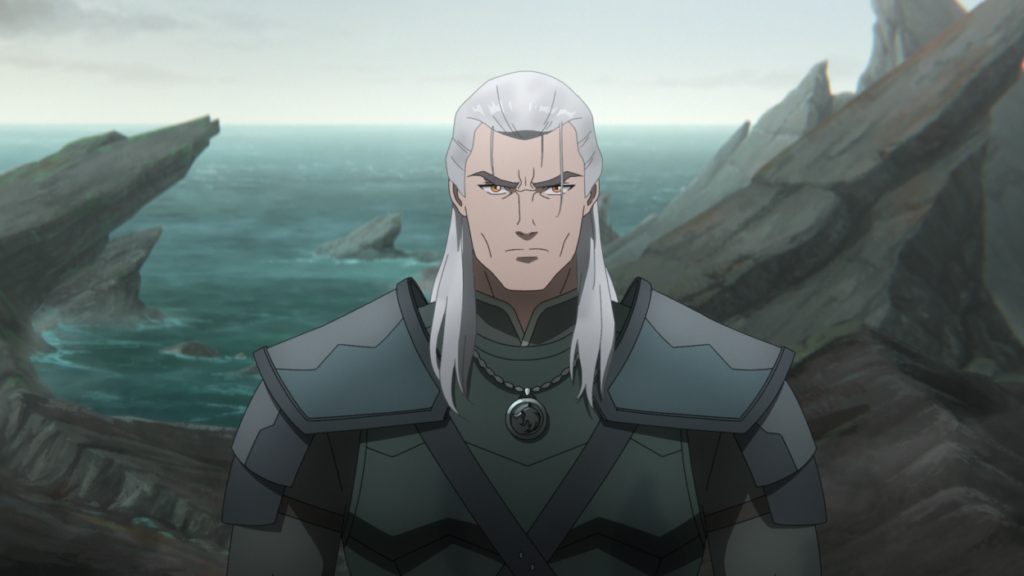Netflix’s animated spin-off The Witcher: Sirens of the Deep is based on one of Andrzej Sapkowski’s most beloved short stories, “A Little Sacrifice”, from the Sword of Destiny collection. It’s mostly fine, but it also makes some crucial changes to the source material, including a big inversion of the ending, and some of them are rubbish. So, let’s talk about it a bit.
This isn’t nitpicking, by the way. Well, maybe it is a bit, but I’m not interested in minor differences, of which there are loads, but significant alterations that give the story itself a different texture, for better or ill (usually ill, if we’re being frank.) I’m genuinely not interested in crying about changes just for the sake of it, or anything that’s perceived to be “woke” – you know who you are – or any of that stuff. Okay? Okay.
The Gist of It
The general idea of both “A Little Sacrifice” and The Witcher: Sirens of the Deep is the same. Geralt and Jaskier are both in the seaside region of Bremervoord, where Geralt is roped into helping to broker a love affair between the local duke, Agloval, and a mermaid princess named Sh’eenaz. This is causing some political turmoil since the merpeople are aggressively isolationist and war between the two kingdoms is threatening to break out, which only becomes more pressing when some pearl divers get murdered, and Geralt involves himself in the investigation.
Crucially, Agloval wants Sh’eenaz to trade in her fin for a pair of human legs, and Sh’eenaz wants Agloval to abandon his life on land and live in the water with her. So, they’re at an impasse. Remember this, as it’ll be important later.
Also involved in this is Essi Daven, a professional rival of Jaskier who falls head over heels in love with Geralt, who finds it difficult to reciprocate her affections because he’s still pining over Yennefer (who is only glimpsed in flashbacks.) This, too, is important to the ending.
Monster Mash
Because it’s courting the mainstream entertainment crowd, The Witcher: Sirens of the Deep has to keep contriving reasons for action, and needless to say the ending includes a gigantic blowout with a kraken as the payoff to a subplot about a sea witch named Mellusina who has been meddling in collusion with Agloval’s father to keep him and Sh’eenaz apart.
“A Little Sacrifice” is more about the narrow aversion of conflict than it is conflict itself, but the adaptation shunts conflict right to the forefront of everything as its dramatic crucible, which is fine but less interesting. If you want to see Geralt twirling in the air slicing off tentacles and cutting lumps out of vodniks, then you’re in luck, but it does kind of muddy the conflict between Agloval and his father and make things a bit arch.
Geralt kills the monsters, by the way. Most of them.
The Change to Sh’eenaz and Agloval’s Story Is Good!
At the end of “A Little Sacrifice”, Sh’eenaz decides to give up her fin and live on land with her love, which is a nice gesture, but at the end of The Witcher: Sirens of the Deep, Agloval decides to become a merman and live under the water with Sh’eenaz.
I don’t mind this change for a few reasons. For one thing, it’s acknowledged during the film that Agloval didn’t do a great deal to warrant Sh’eenaz making such a gigantic sacrifice on his behalf. It makes more thematic sense for him, as someone coming from a life of privilege, to give something up to prove his love for her, not the other way around.
In the case of Sirens of the Deep specifically, this also makes more sense with the plot involving Agloval’s father and the conflict between Bremervoord and the merpeople. The old-school king who had conspired to start a war rather than have his son marry a mermaid would have technically “won” if Sh’eenaz became a human and continued his bloodline. Agloval’s decision isn’t just symbolic of his devotion to Sh’eenaz but also a big middle finger to his father, which he deserves.

Jaskier (Joey Batey) and Geralt (Doug Cockle) in The Witcher: Sirens of the Deep | Image via Netflix
The Change to Essi’s Ending Is Not Good
In the original story the relationship between Geralt and Essi is a tragedy of unrequited love. She falls for him immediately, but because he’s so hung up on Yennefer, he can’t reciprocate her affections, eventually having to let her down by being honest about how he’s feeling.
Sirens of the Deep includes this relationship in much the same terms, but it softens everything, giving Geralt a bit more willingness to explore the idea of their connection and Essi a bit more agency in recognizing and understanding that they can’t be together. It makes things a little easier for them both, which is the problem.
This story isn’t supposed to be easy; on the contrary, it’s about how love is very complicated and hard. One of the realizations that Geralt comes to is that a small sacrifice for love is generally speaking a massive and difficult thing. It makes him reflect more on this relationship with Yen, even though she isn’t physically present. If anything, his affair with Essi is development for Geralt and Yennefer’s love story, which a trick that Sapkowski pulls multiple times throughout the series.
But it’s supposed to be harder for Essi. It’s supposed to be a tragedy. In the original story, Jaskier writes a ballad about a witcher and a bard who meet and fall in love, but he never performs it for anyone. It’s a lamentation about how happy Geralt’s life could have been under slightly different circumstances, if he wasn’t so emotionally beholden to a woman who, in Jaskier’s mind, doesn’t love him for who he is. And after that Essi literally dies. She catches smallpox in Vizima and Jaskier buries her with her lute and a pearl Geralt gave her. She never sees Geralt again.
This stuff is absolutely integral to the story’s underpinnings, and the ending of The Witcher: Sirens of the Deep is significantly weaker without it. Sometimes, the easy road isn’t the best one.




